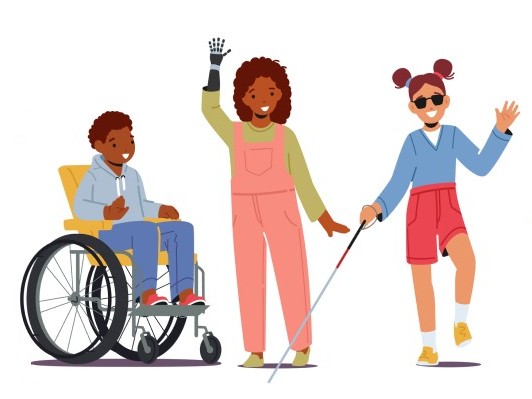SEND Strategy
Welcome to our SEND Strategy
We sincerely thank all our partners and stakeholders, including our children, young people and parents and carers who have invested time and effort to create our SEND Strategy 2022-2025. To keep everyone up to date with how things are progressing, we'll continue to work in partnership with everyone to deliver on our commitments to children and young people with SEND.
Executive summary
Barnsley 2030
Our Barnsley 2030 vision commits to believing in the possibilities of Barnsley and to the future, with excitement and optimism. Our borough is a place that fosters and grows ambition, enabling everyone to be the best they can be.
Barnsley 2030 is relevant to everyone in the borough, including children and young people with special education needs and those who are vulnerable. We all have an important role in working with our partners and stakeholders across the organisational, private, public, voluntary and community sectors to achieve the vision of Barnsley’s future and our long-term ambitions.
By 2030 we want everyone to benefit from, and contribute to, making our borough a thriving place of possibilities.
SEND in our local area
Barnsley Council, Barnsley Integrated Care System (BICS) and the Barnsley Schools Alliance are committed to ensuring that support and provision for special educational needs and/or disability (SEND) are continually improved and that we build the trust and confidence of children, young people and parents/carers in Barnsley’s provision and services across education, health and care.
As a local area, we're ambitious for all our children and young people, inclusive of those who have SEND and/or who are vulnerable, which is why we have high expectations of our early years’ settings, schools, colleges and support services. We want all children and young people in Barnsley to have the best start in life in preparation for their continued progress to becoming young adults.
Just as importantly, we want all young people to have access to opportunities for training, education, employment and apprenticeships to help them gain the skills they need to become independent participants in the local community and to thrive.
As a local area, we have a strong focus on disadvantage and want to help everyone to access their right to an education, be included and achieve their full potential. We take a values-based approach to ensure that children, young people and parents/carers experiences are fully embedded in how we evolve.
Our SEND Improvement Programme
Our SEND Improvement Programme underpins our SEND Strategy 2022-2025, providing an overview of current activities to be undertaken to achieve improvements in SEND provision and services across the local area. The actions have been specifically identified to improve outcomes for children and young people with SEND so that they have the best possible experiences and opportunities to equip them for their future.
About our SEND strategy
We're a force for continual improvement through shared responsibility, intelligence and commitment to achieve the best outcomes for all our children and young people.
Our guiding principles and values
We use the phrase 'a force for continual improvement' to acknowledge that our work is targeted towards improved early identification, support, services and provision across education, health and care.
By using intelligence and being committed, we make sure our work responds to the needs of the local area, is evidence based and we take responsibility for the commitments we make to our children and young people.
Being responsible indicates that we direct our resources to the areas that have the most impact and where children and young people are most at risk of poor outcomes. This means being efficient and prioritising what we know we need to focus on to provide the greatest possible level of support and provision across education, health and care.
Our approach is grounded in what works best to improve outcomes for children and young people so that they can have the best future possible and thrive as part of our local community. We work with and listen to our children and young people, parents and carers and other stakeholders to ensure our values are shared values.
Over the last few years, we've been a force for continued improvement through our SEND Improvement Programme. We've reflected the progress of this and the difference it has made so far in our revised programme, which has been updated to underpin the commitments we are making for the next phase, from 2022-2025.
Children and young people, parents and carers have driven our shared, key values. These are the cornerstones for the SEND Improvement Programme and inform everything we do.
Our values
- Children and young people always come first: we are here for them.
- We will improve outcomes for children and young people.
- Equality, diversity and inclusion are at the core of what we do.
- We are open, transparent, accountable and work in coproduction with partners and stakeholders.
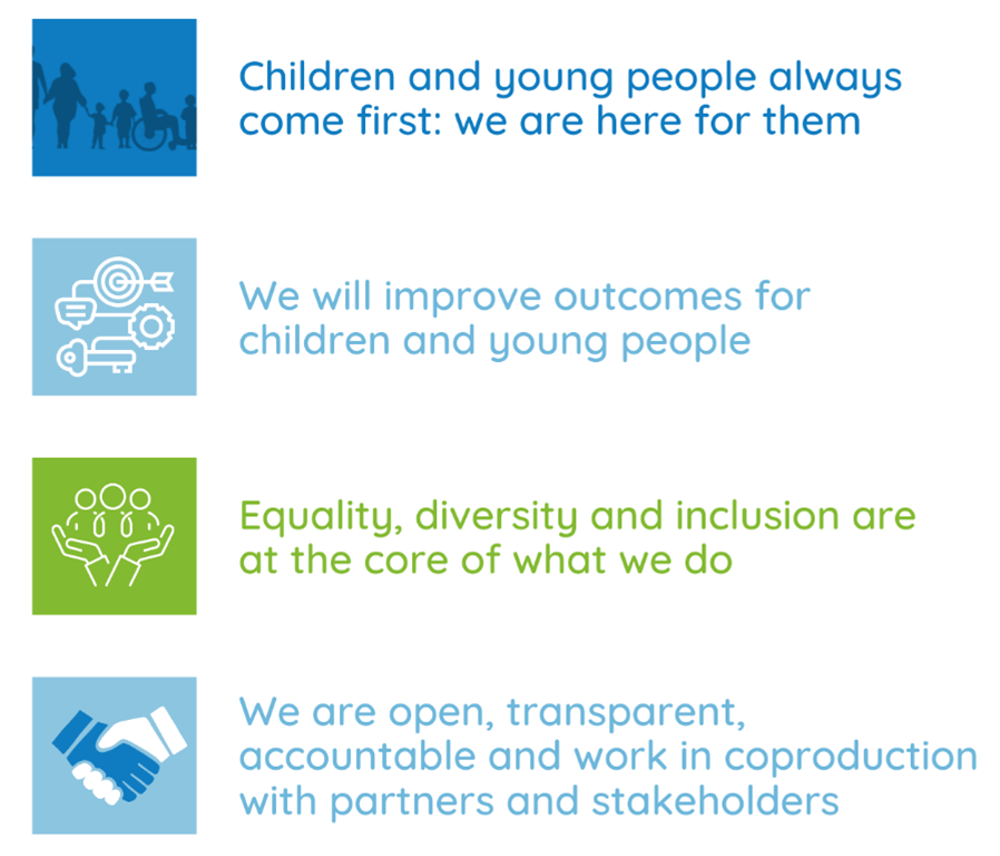
Inclusion statement
Our inclusion statement demonstrates the local area’s commitment to putting children, young people and their families at the heart of everything that we do. Our drive for improvement, opportunities and equity, along with the work we do together, will improve outcomes for all.
Barnsley, the place of possibilities
Our vision is for every child and young person in Barnsley to be fully included, to be happy and thrive in their education and community so that they can develop independence, lead fulfilling lives and achieve outcomes that are important to them.
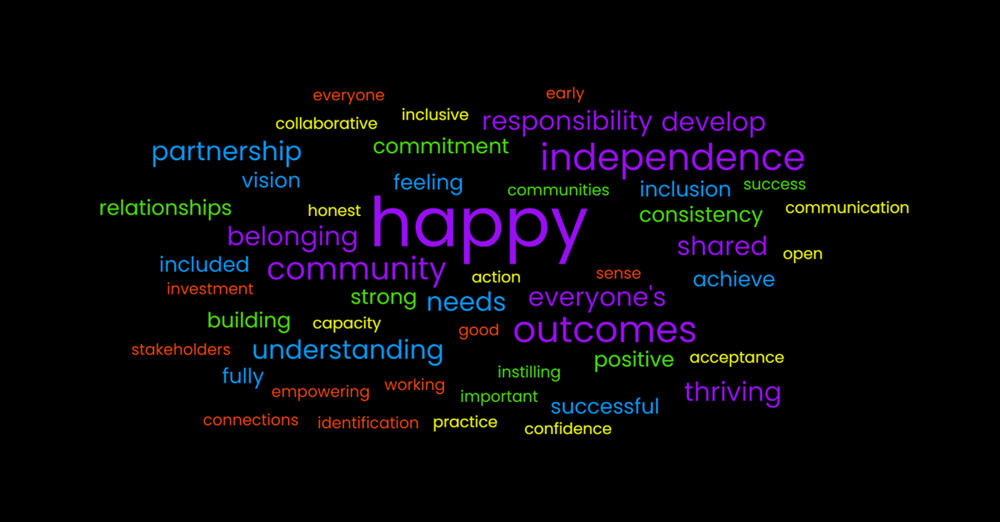
(Everyone. Early. Collaborative. Inclusive. Responsibility. Develop. Partnership. Commitment. Independence. Vision. Feeling. Communities. Inclusion. Success. Relationships. Honest. Happy. Consistency. Communication. Belonging. Happy. Shared. Open. Included. Community. Action. Sense. Achieve. Investment. Strong. Needs. Everyone's. Building. Capacity. Good. Outcomes. Stakeholders. Understanding. Instilling. Positive. Acceptance. Fully. Empowering. Working. Important. Successful. Thriving. Connections. Identification. Practice. Confidence.)
Partners and stakeholders
Communication is a big part of what's happening in Barnsley and we want this to be successful at all levels across the network of partners and stakeholders that make up the local area including:
- children and young people
- parents and carers
- education
- schools/settings
- community
- health
- voluntary sector
- social care
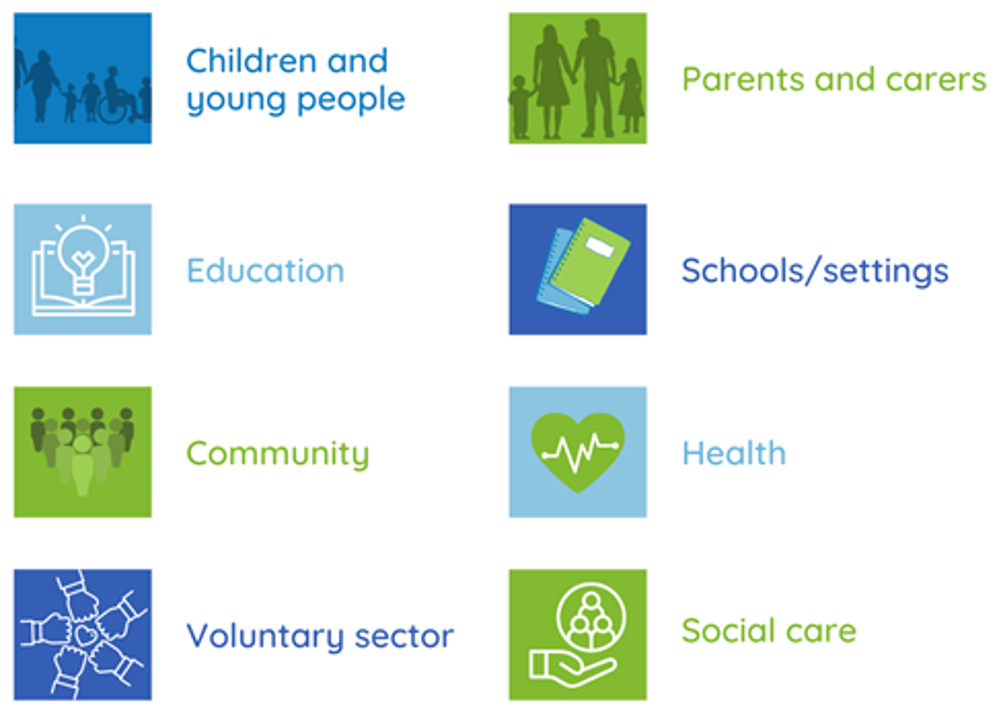
Parents/carers tell us they want to see the following, which we'll prioritise. We'll ensure that there are strategic actions in the underpinning SEND Improvement Programme, which can deliver these priorities:
- Parents and carers are stakeholders and should be treated and respected as such. They should be part of working groups to help to identify issues and implement changes. They can also share experiences to help professionals understand some of the impact of SEND on their lives.
- Create a physical space within the town centre where everyone can find out more about support, opportunities and provision that is available to them. This could be a drop-in shop for all SEND related information, advice and support.
- A range of smaller parent support groups as some parents/carers feel more secure and welcome in a smaller group that is about their child or young person’s needs. A coming together of more confident parents/carers from all groups, to represent views at the strategic level would be best.
- Sessions that are held in different areas of the borough on different days, and at different times so that they fit around busy lives.
- More detail about who is involved with their child or young person’s support and provision and that they have access to information about what they do and how to contact them.
- Clarity about pathways to support for different aspects of education, health and care. This includes levels of SEND, early help, diagnostic pathways and who does what.
- The process for accessing SEND support being easy to follow and understand what options are available in schools and education settings.
- That staff in schools and education settings are trained to support the processes related to SEND and how to work effectively with parents/carers.
- A lending library of resources for SEND being available so that they can borrow resources, rather than spending money to find out that resources are not right for them and their child or young person.
- Peer mentoring from other parents/carers is seen as positive and can help many other parents/carers. This can be supported by peer mentors being well supported themselves by services, for example, accessing training and advice.
As a result, parents/carers of children and young people with SEND will:
- feel like valued partners within the system
- be part of working groups and influence decision making across the local area
- have readily available access to SEND information and services
- have a network of opportunities to gain support and be able to share their ideas and experiences in a way that works for them
- understand what each service is, what they do and how a service can be accessed
- have a strong understanding of the graduated approach and how to access appropriate support at the right time
- have confidence that schools and settings understand the needs of their child
- have access to loaned resources (eg sensory tools)
- be able to access a trained peer support network
SEND in Barnsley
Find out about the level of SEND in Barnsley:
- education, health and care plans (EHCPs)
- level of SEN support in schools
Education, health and care plans (EHCPs)
This data is correct as of January 2022:
- 29.1% of the population in Barnsley are aged 0-25.
- 2311 plans are maintained.
- 4.5% of pupils in Barnsley schools have an EHCP.
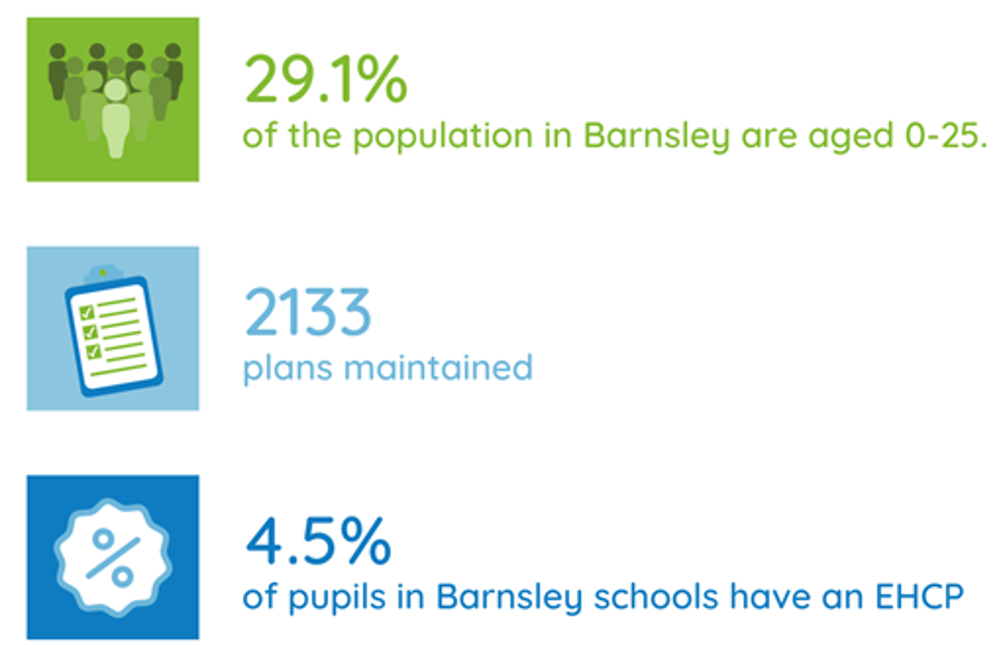
EHCP % by school place
- 2.7% primary
- 3% secondary
- 100% special
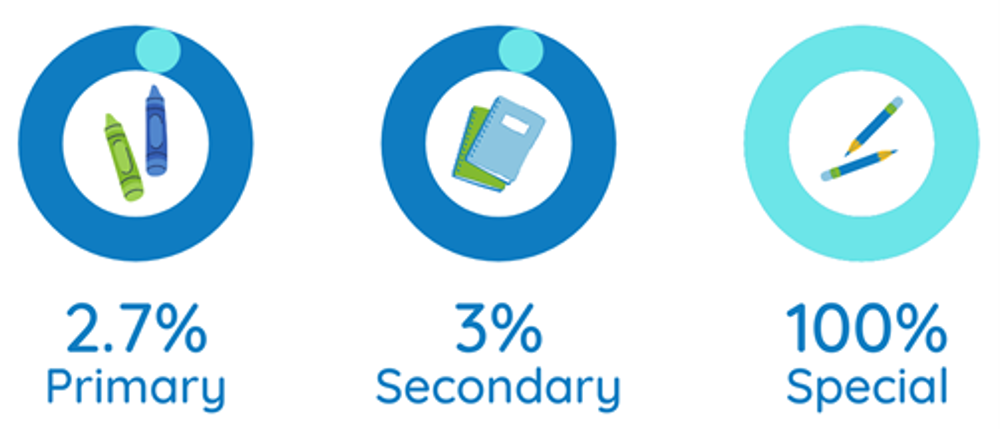
EHCP age breakdown
| Age | Percentage |
| 0-4 | 3.2% |
| 5-10 | 33.8% |
| 11-15 | 39.5% |
| 16-19 | 20.4% |
| 20-25 | 3.1% |
Primary need - all state funded schools
| EHCP need | Number of EHCPs |
| Autism spectrum disorder (ASD) | 436 |
| Speech, language and communication need (SLCN) | 308 |
| Social, emotional and mental health (SEMH) | 268 |
| Moderate learning difficulty (MLD) | 128 |
| Specific learning difficulty (SpLD) | 69 |
| Physical disability (PD) | 67 |
| Specific learning disability (SLD) | 49 |
| Hearing impairment (HI) | 33 |
| Profound, multiple learning disability (PMLD) | 28 |
| Other (OTH) | 26 |
| Visual impairment (VI) | 17 |
| Multi sensory impairment (MSI) | 4 |
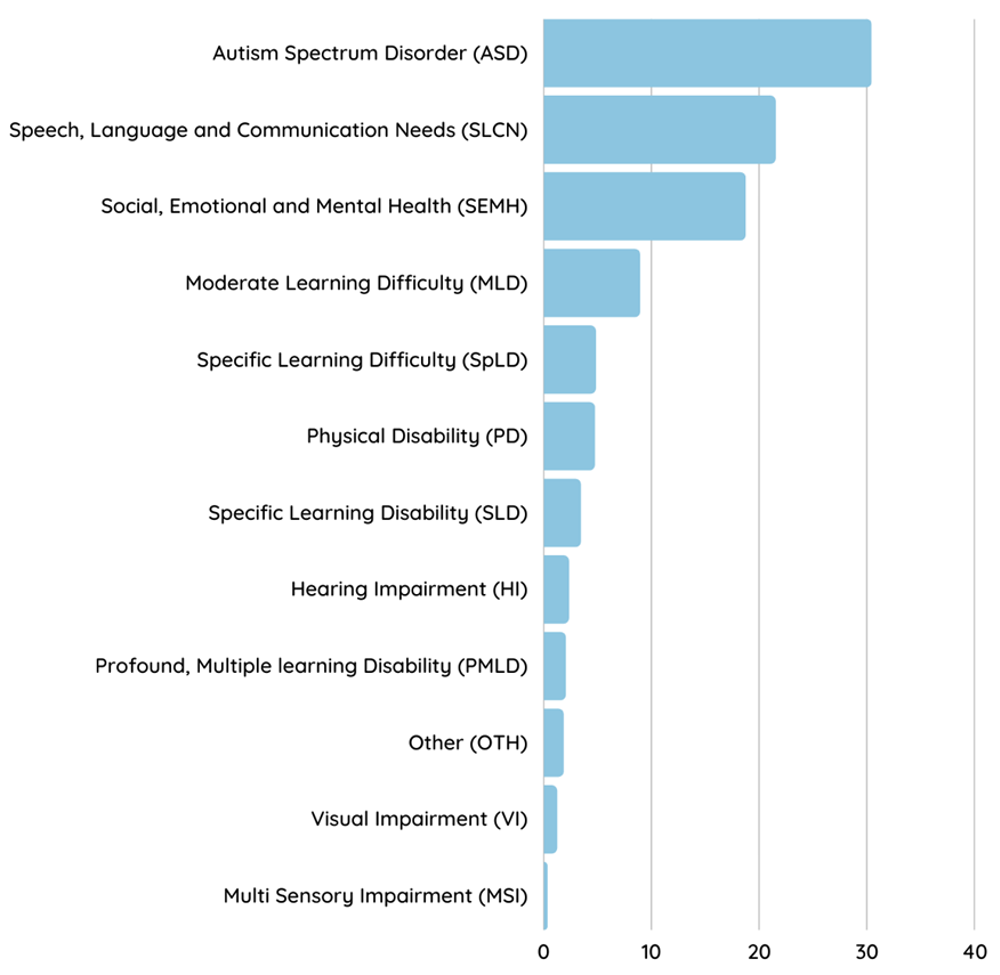
Barnsley SEN support
This data is correct as of January 2022:
SEN support % by school place
- 10.9% all schools
- 11.1% primary
- 11.1% secondary
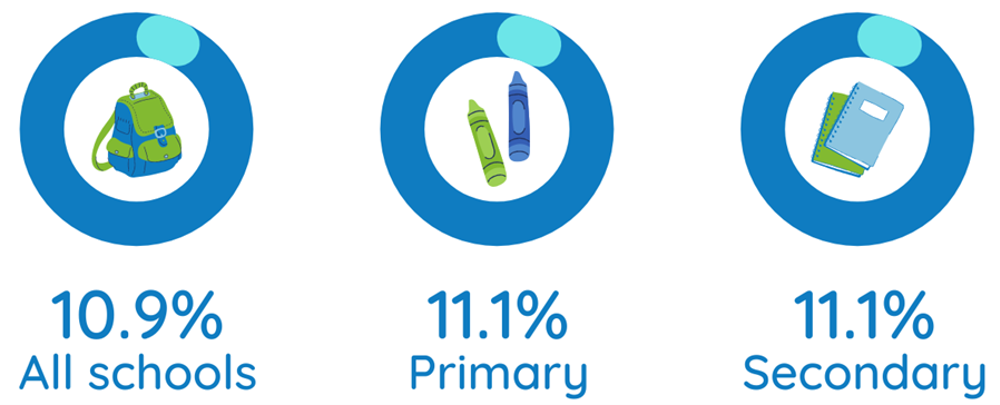
Primary need - all schools
| SEN support need | Number |
| Moderate learning difficulty (MLD) | 1042 |
| Speech, language and communication need (SLCN) | 877 |
| Social, emotional and mental health (SEMH) | 871 |
| Specific learning difficulty (SpLD) | 372 |
| Autism spectrum disorder (ASD) | 328 |
| Other (OTH) | 131 |
| Physical disability (PD) | 82 |
| Hearing impairment (HI) | 60 |
| Visual impairment (VI) | 37 |
| Specific learning disability (SLD) | 17 |
| Multi sensory impairment (MSI) | 7 |
| No specialist assessment (NSA) | 5 |
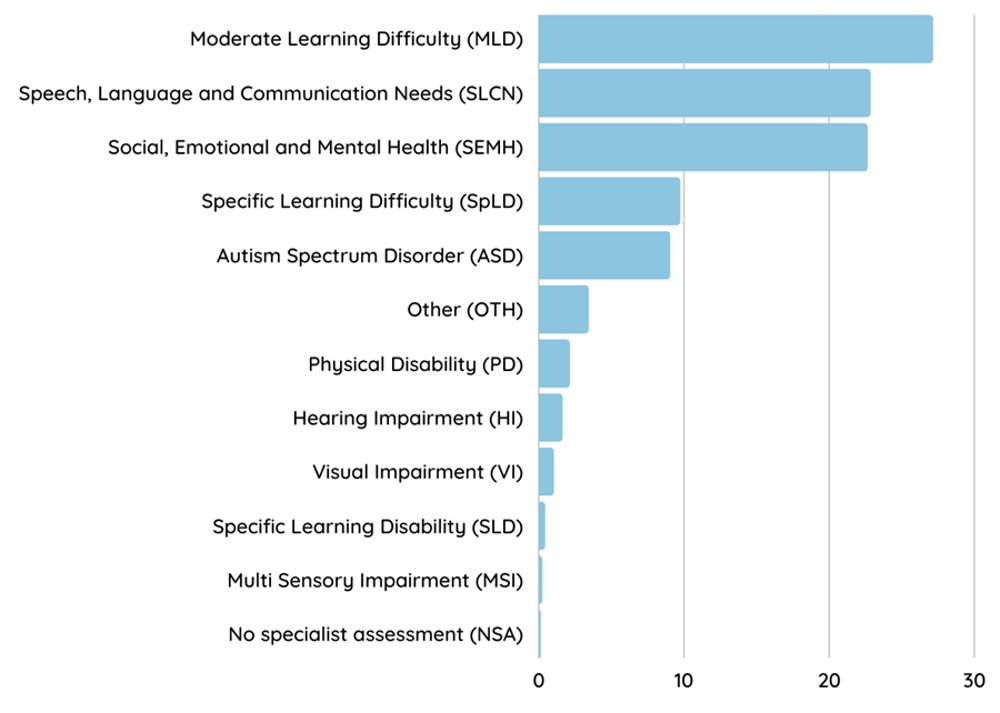
SEND Improvement Programme
To fulfil our commitments we have 10 strategic priorities and enablers. These have been agreed over the last phase of the SEND Strategy, and make up the SEND Improvement Programme. This has been refreshed to incorporate the actions in this strategy from 2022-2025.
Priorities/enablers
| Number | Priority/enabler | Focus |
| Priority 1 | Engagement, participation and coproduction: children and young people (SEND Oversight Board) | Parent/carer engagement, participation and coproduction. |
| Priority 2 | Engagement, participation and coproduction: parent/carer: forms part of the written statement of action (WSoA) (SEND Oversight Board) | Identifying and meeting needs across all areas of SEND. |
| Priority 3 | Early identification and SEN support: forms part of the written statement of action (WSoA) (Barnsley Schools Alliance) | Children and young people’s engagement, participation and coproduction. |
| Priority 4 | Meeting needs through specialist support and provision (SEND Sufficiency Group) | Universal and specialist support and provision, including sufficiency of places. |
| Priority 5 | Communication and interaction: autism (Autism Partnership Board)/speech, language and communication needs (SLCN Steering Group) | Autism and speech, language and communication needs (SLCN). |
| Priority 6 | Preparation for adulthood (PfA Steering Group) | PfA from the earliest years and transitions. |
| Enabler 1 | Quality of data | Local area knowledge and intelligence. |
| Enabler 2 | Local offer | What’s available and how it's communicated. |
| Enabler 3 | Financial balance | Ensuring value and best use of resources. |
| Enabler 4 | Workforce development | Building capacity across the system. |
By delivering these priorities and the enablers that will drive success, we'll see positive outcomes for all children and young people across the borough. The outcomes embedded in this strategy have been crafted and captured over time by our children and young people. These outcomes underpin all areas within the SEND Improvement Plan.
Outcome area one: independent living
What independent living means to us
As young people grow older, they may want to live alone, or with others, in their own home. In Barnsley, young people have told us that independent living is more than just about where you live. They also feel that being as independent as possible, is just as important as who you live with. To make sure that young people can live as independently as possible, there needs to be lots of support available depending on their needs.
We will:
- Create more accessible information, advice and support for young people about the things that are important to them, including sex and relationship education.
- Develop a joined-up transitions team that includes children’s and adult social care and provides a consistent offer relating to assessment, support and services.
- Review and develop our commissioning agreements between the local authority and the Integrated Care Board (ICB) so that key health services have a better transition plan between children’s and adult services.
- Work with schools and education settings to promote more lessons on vital life skills, including cooking, travelling, money management, and learning about mortgages to prepare for adulthood.
- Develop accessible information about the education, health and care (EHC) process and what this means for sixth form, university, and going into work much earlier than it's currently provided.
- Provide more information, advice and support about what is available to support a young person to be able to live away from home.
- Enable parents and carers to access information that helps them to support their children and young people to make decisions about their future.
- Ensure that all children and young people begin preparation for adulthood at the earliest stage. This will prepare them for change throughout their individual journey, so that work is completed to enable them to begin to make decisions at the earliest opportunity about their future.
As a result, children and young people with SEND will:
- Develop the right skills to be as independent as possible.
- Benefit from having the right support from the people in their life.
- Feel that they can make decisions with the support of people around them when it comes to their own life and care needs.
- Feel confident in expressing themselves, including speaking out and feeling that they're listened to.
- Benefit from the support and encouragement from their family, carers, friends and professionals to be independent but provide support when it's needed.
- Benefit from access to the same chances and opportunities as everyone else.
- Be treated equally and included in their local community.
- Be comfortable being alone and in their ability to actually be alone.
- Have the skills to help them live the best life they can.
- Be supported to be ambitious.
- Be able to budget and manage their finances, with the right support when this is needed.
Outcome area two: community inclusion
What community inclusion means to us
As young people prepare for adulthood, they may want to get involved in their local community in all sorts of ways. Whether this means joining a local group, taking part in council or service run activities, or building friendships and maintaining relationships all depends on the individual.
Becoming an adult means all the opportunities that are available to support this are available to everyone, regardless of individual needs. Friendships, relationships and understanding yourself and who you want to be is a big part of becoming an adult. As well as understanding what a good and a bad relationship or friendship is, finding out more about sexual health, body image and emotions is also important to get around and be included in the local and wider community.
We will:
- Ensure a stronger support network and opportunities for young people who are in the 18 to 25 age phase so that social opportunities don’t just stop.
- Create a physical space within the town centre where everyone can find out more about support, opportunities and provision that is available to them. This could be a drop-in shop for all SEND related information, advice and support.
- Work with the voluntary sector to explore what else can be provided in the local community and support this.
- Use family hubs to support families so that they can enjoy happy, healthy, and longer lives in safer and stronger communities.
- Support clubs and activities that are available for everyone, really are available for everyone, regardless of their support needs. This might mean training, support and advice for lots of organisations who provide social and community activities.
- Work in collaboration with partners and stakeholders to provide more information about pathways into sports and afterschool clubs for children and young people who have SEND.
- Promote volunteering opportunities for young people with SEND, which can provide unique experiences. More activities for this need to be made available which offer a variety of experiences, including within the council.
- Support wellbeing groups for parents/carers so that they feel empowered and more able to access things in the community for themselves and for their children and young people.
As a result, children and young people with SEND will:
- Have a full and stimulating life that includes friends and family as well as in the community.
- Have a productive, supportive family life, where families are content and can take the opportunities that fit with their own lives.
- Be able to socialise with friends and explore relationships safely.
- Have healthy, sustained friendship groups and friends who support and understand them.
- Feel safe when they are out by themselves and with friends, accessing the local community.
- Have good knowledge of the clubs and social opportunities they can attend and take advantage of these.
- Be able to have a good time and feel happy.
Outcome area three: health and wellbeing
What health and wellbeing means to us
Physical, social, emotional and mental health is really important to children and young people in Barnsley. They tell us they want access to correct services with clear routes and pathways from the earliest opportunities. Friendships and relationships are a vital part of growing up. Children and young people with SEND want to learn alongside their friends to develop and sustain appropriate friendships. They tell us that without the correct support around them their health and wellbeing needs often become negatively impacted and can lead to further difficulties.
Effective communication is vital for families to have confidence in accessing services. This includes transitions and situations where more than one agency is involved.
We will:
- Provide training for partners to support appropriate and timely referrals to other services.
- Create clear referral processes.
- Provide correct and clear information about the role and function of each service.
- Ensure services are appropriate to match need.
- Improve support for families who are experiencing difficulties regardless of diagnostic outcome.
- Support families through family hubs so that children and young people are safe and healthy and gain the best start in life.
- Communicate education, health and care needs across all services.
- Support the rollout and use of health passports for children and young people with SEND.
- Facilitate better working relationships between services especially at key transition phases.
- Improve information for children and young people around sexual health and positive relationships.
- Promote opportunities and pathways into sport for children and young people.
- Improve health professional’s knowledge and understanding of para sports and documentation that accompanies this.
As a result, children and young people with SEND will:
- Know where to get the correct information and advice to support their health needs at the earliest point of time.
- Benefit from the people who care for them feeling supported to be as healthy as they can be.
- Have the information they need to know where to get the right support from for their mental health needs.
- Have a better understanding of what GPs can offer and take advantage of what’s available.
- Be able to make informed choices about sexual health and positive relationships.
- Have the correct information and documents to be able to communicate their needs as independently as possible.
- Have opportunities to access and engage with sports.
Outcome area four: education and employment
What education and employment means to us
Children and young people tell us that they want to be included in their local education school or setting as much as possible. Being part of their community is part of their education. Children and young people need to feel like they belong and want to learn in education settings that have staff who understand their needs and can help them to make progress, including academic, social and emotional progress. They want to be happy and learn alongside their peers. Young people want a variety of post 16 options that are explained at the earliest opportunity by education providers.
As children grow, becoming an adult, for many, means moving towards employment. Young people require support to understand all the pathways and routes to further education and employment. There needs to be sustained and meaningful opportunities for young people who are about to embark on the next stage in their lives.
We will:
- Focus on identification of need and early intervention in schools and education settings including early years providers.
- Ensure there are sufficient places in schools to meet the needs of children and young people in the right way in their local school or education setting.
- Work with mainstream schools and education settings to support how they can meet the needs of children and young people at the SEN support and the education, health and care plan (EHCP) level through awareness raising and training at all levels.
- Work with schools and education settings to ensure the best use of the high needs capital funding to improve facilities and the environment to support children and young people with SEND.
- Ensure that there are enough specialist placements to meet the needs of the local population within Barnsley and map this out for the period of this strategy and into the future, in consideration of forecast needs.
- Explore what can be done to offer parent/carer support in schools and education settings in partnership with special educational needs coordinators (SENCos) and services.
- Ensure that there are sufficient options available for young people when they leave school, including apprenticeships, sixth form, work-based opportunities and further education.
- Promote and expand the inclusive offer in Barnsley, so that more young people have access to employment pathways that meet their needs, including through: work placements, work experience, apprenticeships, supported internships, traineeships and T-level placements.
As a result, children and young people with SEND will:
- Be able to make a positive contribution and play an active role in their community.
- Benefit from the right support so they can continue to learn new skills and knowledge.
- Be able to use their skills in their own community and the wider world.
- Have, and make use of, the same opportunities as everyone else because they get the right support and encouragement to do so.
- Enjoy a sense of achievement through voluntary roles in their community to continue to build skills and gain future employment.
Outcome area five: choice and control
What choice and control means to us
When we talk about children and young people with SEND, we include those who are vulnerable for many different reasons and who are likely to need support from multiple services during their life. Many children and young people who have SEND will have lives that have been made more complex by all the different, agencies, policy and legislation that shape the support they might need. Services may include those from education, health and care, including specialist teachers, child and adolescent mental health services (CAMHS), children with disabilities and other social care teams, health services and specialist education support, to name but a few.
Other people around the child or young person, including their families, may also have their own support needs and this is when early help services may be required. Throughout all of this, it's vitally important that the voice of the child, young person and their family are kept at the heart of decision making with choice and control being paramount.
We will:
- Work collaboratively with strategic partners to explore and develop the use of personal budgets across education, health and care for young people who have SEND so that they have more choice and control about the services they receive.
- Explore the creation of a town centre public information drop-in shop where parents/carers can call in and collect information on what they need in a format that suits them, including accessing advice from professionals, at their own pace.
- Keep all support and provision under review through an agreed schedule to identify what needs reviewing and carrying out focused work to understand how service are working and what needs to change. This will include partners and stakeholders.
- Ensure that children, young people and parents/carers can access information in an understandable format so that they can make informed choices. This includes making sure that information is readily available in all formats, including paper based if this is requested.
- Ensure that children and young people are treated as individuals when professionals are involved, rather than being combined into a general category of need. This also means looking at criteria for access to services and removing diagnosis-based access unless there is a specific and/or justifiable reason for this.
As a result, children and young people with SEND will:
- Be able to put their views across and feel listened to.
- Be supported to express their thoughts and feelings about what is right for them, leading to more power over their own lives.
- Understand how to make their own decisions in the way that works for them.
- Express themselves, speak out and feel that they are listened to.
- Benefit from services that are shaped by their own opinions, thoughts and needs.
- Be given information about their rights and choices without having to ask for it or seek it out themselves because they won’t know what they don’t know.
- Feel supported, when they want to do new things, to understand what might go wrong, but also to try, even if it might not always work out how it was intended.
Governance structures
The improvements we've identified in the SEND Strategy are underpinned by the wider SEND Improvement Programme.
Implementation of the programme will be governed by the SEND Oversight Board.
Delivery of the plan
Progress on the SEND Improvement Programme will be monitored and reported to the council’s Cabinet, Barnsley Council’s senior management team, Integrated Care System governing body and Barnsley Schools Alliance Board on a quarterly basis as part of the ongoing cycle of reporting.
Work is done through the priority workstreams and subgroups, all of which include representation from education, health and care, 0-25, and are responsible for parts of the overall SEND Improvement Programme. Priority workstreams and subgroups meet every half term and report up to the SEND Oversight Board. There is regular reporting at the trust level and quarterly reports to cabinet have been in place for some years and continue into the period of this strategy. These include narrative about progress, performance data and financial information related to SEND.
We recognise it's important to be clear about who has responsibility and accountability for delivery of the SEND Strategy at the strategic organisation level. Roles of key accountable officers and partners are included in our SEND Improvement Programme so that it's plain which individuals are accountable for ensuring the delivery of aspects of the strategy.
Where appropriate, we've shown that there is a shared responsibility and accountability. For example, having education, health and care roles against actions in the SEND Improvement Programme, shows how education, health and social care colleagues share equal responsibility for improvements and play an active part in delivering those.
The benefit of all our work will be felt in the way our children and young people have their needs identified and met across education, health and care, covering the 0-25 age range and in how they are enabled to achieve the best outcomes possible.
Governance groups
All our governance groups work in partnership across education, health and social care as part of Barnsley local area. Groups meet at least on a half termly basis.
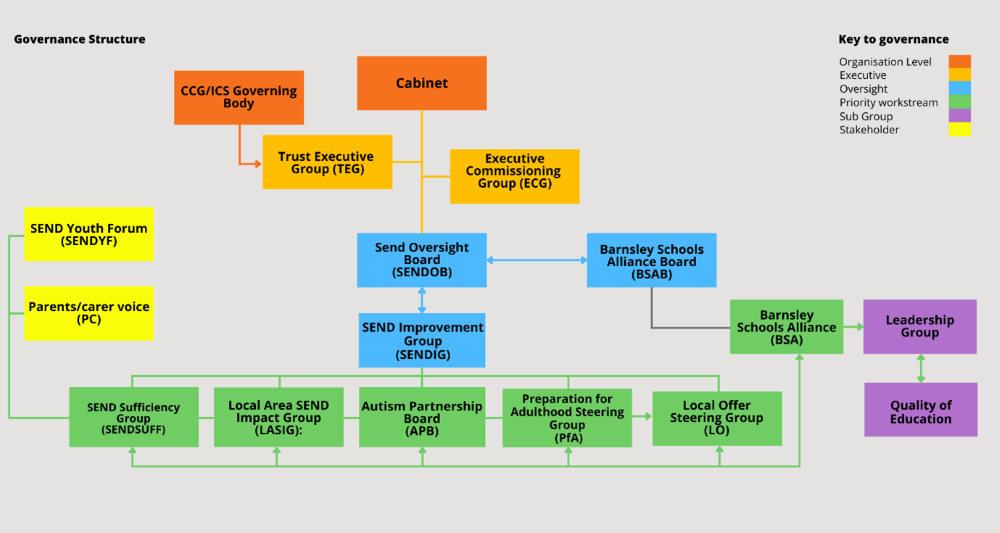
| Group | Details |
| Cabinet | Barnsley Council leadership for the borough. |
| Trust Executive Group | Local authority and Barnsley Integrated Care System executive partners with decision making responsibilities. |
| SEND Oversight Board | Strategic accountability for SEND and vulnerable learners. |
| Barnsley Schools Alliance Board | Strategic oversight of school’s partnership in collaboration with the local authority and the Barnsley Integrated Care System. |
| Leadership Group | Subgroup of Barnsley Schools Alliance focusing on leadership across the system. |
| SEND Sufficiency Group | Development, implementation and oversight of place planning and specialist provision. |
| Barnsley Integrated Care System Governing Body | Strategic oversight of health provision in the local area. |
| Executive Commissioning Group | Local authority and Barnsley Integrated Care System joint commissioning and high-level monitoring. |
| SEND Improvement Group | Check and challenge for delivery of the SEND Improvement Programme. |
| Barnsley Schools Alliance | Schools partnership for the local area. |
| Quality of Education | Subgroup of Barnsley Schools Alliance focusing on improving education across the system. |
| SEND Youth Forum | Children and young people’s voice, to influence decision making in the local area. |
| Local Area SEND Impact Group | Partnership working to identify gaps, initiate project and monitor performance and impact. |
| Autism Partnership Board | Partnership working to develop, deliver and oversee all age autism strategy. |
| Parents/carer voice | All parent/carer groups and individual voices are able to influence decision making in the local area. |
| Preparation for Adulthood Steering Group | Development and implementation of improvements for key transitions and long-term outcomes. |
| Local Offer Steering Group | Partnership working across education, health and care to oversee and improve the local offer. |
What success looks like and how it's measured
We've included success criteria and a performance data in our SEND Improvement Programme, which will show where we were at the beginning of the strategy and how this changes over time, to where we want to be.
The data we use includes performance data; things we can measure in numbers or percentages, and perceptive data; things we can measure by assessing where we are and how things have improved, according to our partners and stakeholders. We'll be reporting our progress every term so that we're transparent about what we achieve.
To maintain progress checks, progress, highlights and challenges will be reported at SEND Oversight Board and in quarterly reports to Cabinet throughout the life of the strategy. This will be discussed and monitored at all strategic meetings, workstreams and subgroups and progress against each action will be assessed.

